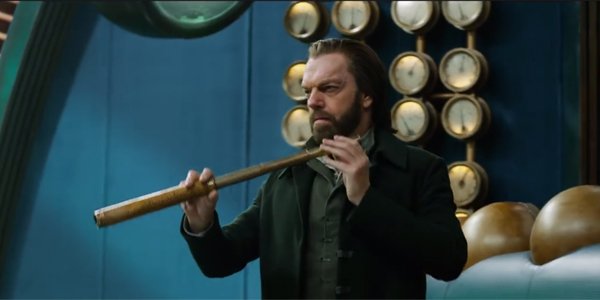Why Peter Jackson Is Very Excited About Making Mortal Engines Sequels

Peter Jackson is a man who knows a thing or two about building franchises. After all, he is the man behind one of the most successful, ambitious examples ever to come out of Hollywood. That in mind, most recently he's been putting his brain power into Mortal Engines, the upcoming adaptation based on the novel by author Philip Reeve, and he definitely has sequels in his thoughts. Why? Because he believes that the source material only improves as it progresses:
You should [read all the books] because they actually get better and better. This is one movie where I hope it's successful enough that we get to do the other stories, because the other books are really... this story mushrooms in such unexpected ways in the future books. So, I really hope we get to make those films. It's cool. It's a love story. It's an unlikely love story. It's about a young woman who doesn't really think that she will ever find love, and she finds it in a very unexpected way in the middle of this chaotic, strange world that we're in. And I also just like the idea of seeing big cities eat other.
That quote comes from an interview I did last summer on the set of Mortal Engines down in Wellington, New Zealand -- which I had been invited to along with a small group of other journalists. While talking with Peter Jackson, who is serving as both co-writer and producer on the movie, the filmmaker was asked about what has kept him interested in the project, having started to develop it back in 2009. His explanation was that he just really loves the source material, and feels that it can develop into something great over the course of multiple chapters.
The first Mortal Engines book was published in 2001, but its quickly-earned popularity allowed it to spawn a sequel two years later: Predator's Gold. Ultimately Philip Reeve wrote four books in the series, with the first two novels followed by 2005's Infernal Devices and 2006's A Darkling Plain. Hollywood has certainly seen a number of these kinds of franchises be successful in recent years, and if the quality and audience reaction proves strong enough, it's easy to imagine big screen follow-ups.
To that end, Peter Jackson also told us that the Mortal Engines movie will feature particular references and keep a few doors open -- allowing a sequel to pick up certain threads. That being said, he also stressed that these elements would remain small and wouldn't detract from the larger self-contained nature of the story being told, just in case sequels don't wind up happening. Said Jackson,
I think that is where we have an advantage where Philip Reeve didn't, because when he wrote the first book I don't think he knew he was going to write the other books. I think he wrote that one book as a story, and then through the fact that people liked it and obviously he thought he had more story to tell, he carried on. We have benefited, obviously, knowing now what's in the other books in the future. So there are little subtle things we're doing that will help us flow into the other. They're not anything that changes anything much, but it's just stuff that because we know what is going to happen in the future with these books in the story we're able to plant little things here and there that will be helpful to us should we be so lucky to make more films.
Directed by Christopher Rivers, Mortal Engines is a sci-fi adventure movie set in a future decimated by nuclear war. What remains of the world are various cities that operate as giant mobile machines, the bigger ones devouring the smaller ones to take their resources and grow even larger. Robert Sheehan, Hera Hilmar star, with Hugo Weaving, Stephen Lang, and Colin Salmon in supporting roles. The film will be in theaters on December 14th -- and stay tuned here on CinemaBlend for more about our time on set!
Your Daily Blend of Entertainment News

Eric Eisenberg is the Assistant Managing Editor at CinemaBlend. After graduating Boston University and earning a bachelor’s degree in journalism, he took a part-time job as a staff writer for CinemaBlend, and after six months was offered the opportunity to move to Los Angeles and take on a newly created West Coast Editor position. Over a decade later, he's continuing to advance his interests and expertise. In addition to conducting filmmaker interviews and contributing to the news and feature content of the site, Eric also oversees the Movie Reviews section, writes the the weekend box office report (published Sundays), and is the site's resident Stephen King expert. He has two King-related columns.
